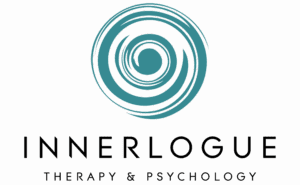Grief & Loss Therapy in calgary
At Innerlogue Psychology and Therapy, we understand that grief is a deeply personal journey. Whether you’re mourning the loss of a loved one, a relationship, a pet, or a life change, our Calgary-based grief therapists are here to support you in a safe and protected environment with understanding and expertise.

What Is Grief Therapy?
Grief therapy is a specialized form of counselling that helps individuals process loss and navigate the emotional, mental, and sometimes physical impacts of grief. Our therapists offer a safe, non-judgmental space for you to explore your emotions, honour your loss, and begin to heal at your own pace.
How We Support You
Our grief counselling approach is personalized, evidence-based, and rooted in empathy. We use techniques from cognitive-behavioral therapy (CBT), narrative therapy, and mindfulness-based practices to support you in:
- Making sense of your grief and emotional responses
- Developing healthy coping strategies
- Reducing feelings of guilt, anger, or depression
- Reconnecting with life and meaning after loss
Whether your grief is recent or long-standing, we’re here to help you move forward in a way that honours your experience.
How grieve can affect you
Grief symptoms can vary widely from person to person, but they often affect emotions, thoughts, physical health, and behavior. Here’s a list of common grief symptoms that people may experience:
Emotional Symptoms
Deep sadness or tearfulness
Anger or irritability
Guilt or regret
Anxiety or fear (especially about the future)
Numbness or emotional detachment
Loneliness or feeling disconnected from others
Longing or yearning for the person or situation lost
Cognitive Symptoms
Difficulty concentrating
Confusion or forgetfulness
Preoccupation with the loss
Questioning the meaning or purpose of life
Intrusive thoughts or flashbacks related to the loss
Physical Symptoms
Fatigue or low energy
Changes in appetite (eating too much or too little)
Sleep disturbances (insomnia or oversleeping)
Headaches or body aches
Stomach issues or nausea
Weakened immune response (getting sick more easily)
Behavioral Symptoms
Withdrawing from social activities
Avoiding reminders of the loss
Engaging in risky or impulsive behaviors
Crying frequently or suppressing emotions
Difficulty returning to routines or responsibilities
These symptoms can come and go in waves and may be more intense around anniversaries, holidays, or reminders of the loss. If grief begins to interfere with daily life for an extended period, professional support—such as grief therapy—can be incredibly helpful.
Types of Grief Counselling Treatment Modalities
Grief is a deeply personal and complex emotional response to loss. Whether you’re coping with the death of a loved one, a relationship breakdown, or another form of loss, grief can affect every aspect of your life. Grief counselling offers support and therapeutic tools to help individuals process loss and find a way forward. At Innerlogue Psychology and Therapy, we provide a range of evidence-based grief counselling treatment modalities tailored to your unique experience and needs.
Below are the most common and effective grief counselling approaches used by mental health professionals today.
1. Cognitive Behavioural Therapy (CBT) for Grief
What it is: CBT focuses on identifying and challenging negative thought patterns and behaviours that may prolong or intensify the grieving process.
How it helps:
- Addresses unhelpful thoughts like guilt, blame, or hopelessness
- Encourages healthier coping strategies
- Helps individuals set achievable goals for healing
- CBT is particularly effective for those experiencing complicated or prolonged grief.
2. Complicated Grief Therapy (CGT)
What it is: A structured, time-limited treatment specifically developed for prolonged or “complicated” grief that doesn’t ease over time.
How it helps:
- Uses elements of CBT, attachment theory, and exposure therapy
- Helps clients re-engage with life while honouring the memory of the person who died
- Aims to resolve grief-related dysfunction and distress
- CGT is ideal for individuals who feel stuck in grief or who struggle with daily functioning months or years after a loss.
3. Narrative Therapy
What it is: Narrative therapy helps individuals make sense of their loss by exploring the story of their relationship with the deceased and their grief.
How it helps:
- Encourages clients to express and re-author their grief story
- Helps find meaning in loss and preserve a continuing bond
- Offers space to reconstruct identity after loss
This approach can be especially healing for those who want to explore the spiritual or existential impact of grief.
4. Acceptance and Commitment Therapy (ACT)
What it is: ACT combines mindfulness techniques with strategies that help clients accept painful emotions and commit to actions aligned with their values.
How it helps:
- Supports emotional flexibility in the face of loss
- Teaches mindfulness and present-focused awareness
- Encourages clients to live meaningfully despite grief
ACT is beneficial for clients seeking a balance between acknowledging pain and building a fulfilling life post-loss.
5. Emotionally Focused Therapy (EFT)
What it is: EFT focuses on emotional processing and the importance of secure attachment in relationships.
How it helps:
- Addresses emotional blocks and deepens self-awareness
- Encourages expression of emotions like sadness, anger, or fear
- Promotes healing through emotional connection and security
This modality is especially useful in couples or family grief therapy sessions.
6. Group Therapy for Grief
What it is: A facilitated support group where individuals can share their experiences of loss in a safe, compassionate space.
How it helps:
- Reduces isolation by connecting with others facing similar losses
- Provides shared coping tools and insights
- Offers a sense of community and understanding
Group therapy can be an effective complement to individual grief counselling.
7. Mindfulness-Based Grief Therapy
What it is: A therapeutic approach that uses mindfulness practices like meditation, breathing exercises, and body awareness to support healing.
How it helps:
- Encourages acceptance of emotions without judgment
- Helps reduce anxiety, stress, and depression related to grief
- Builds resilience and emotional regulation skills
Mindfulness can be especially helpful for clients who struggle with overwhelming or persistent grief symptoms.
8. Art and Expressive Therapies
What it is: These creative therapies allow clients to process grief through art, music, writing, or movement.
How it helps:
- Offers non-verbal ways to express deep emotions
- Facilitates self-discovery and meaning-making
- Can be tailored to children, teens, and adults
Expressive therapies are especially effective for clients who find it difficult to articulate their grief through traditional talk therapy.
Finding the Right Grief Counselling Approach for You
At Innerlogue Psychology and Therapy, our compassionate therapists are trained in a wide range of grief counselling treatment modalities. We recognize that every person’s grief journey is different. Whether you’re navigating recent loss or unresolved grief from years past, we’ll work with you to choose the approach that fits your emotional needs, personality, and healing goals.
Ready to begin your healing journey?
Contact us today to schedule a confidential consultation and learn more about how our personalized grief counselling services can support you.







